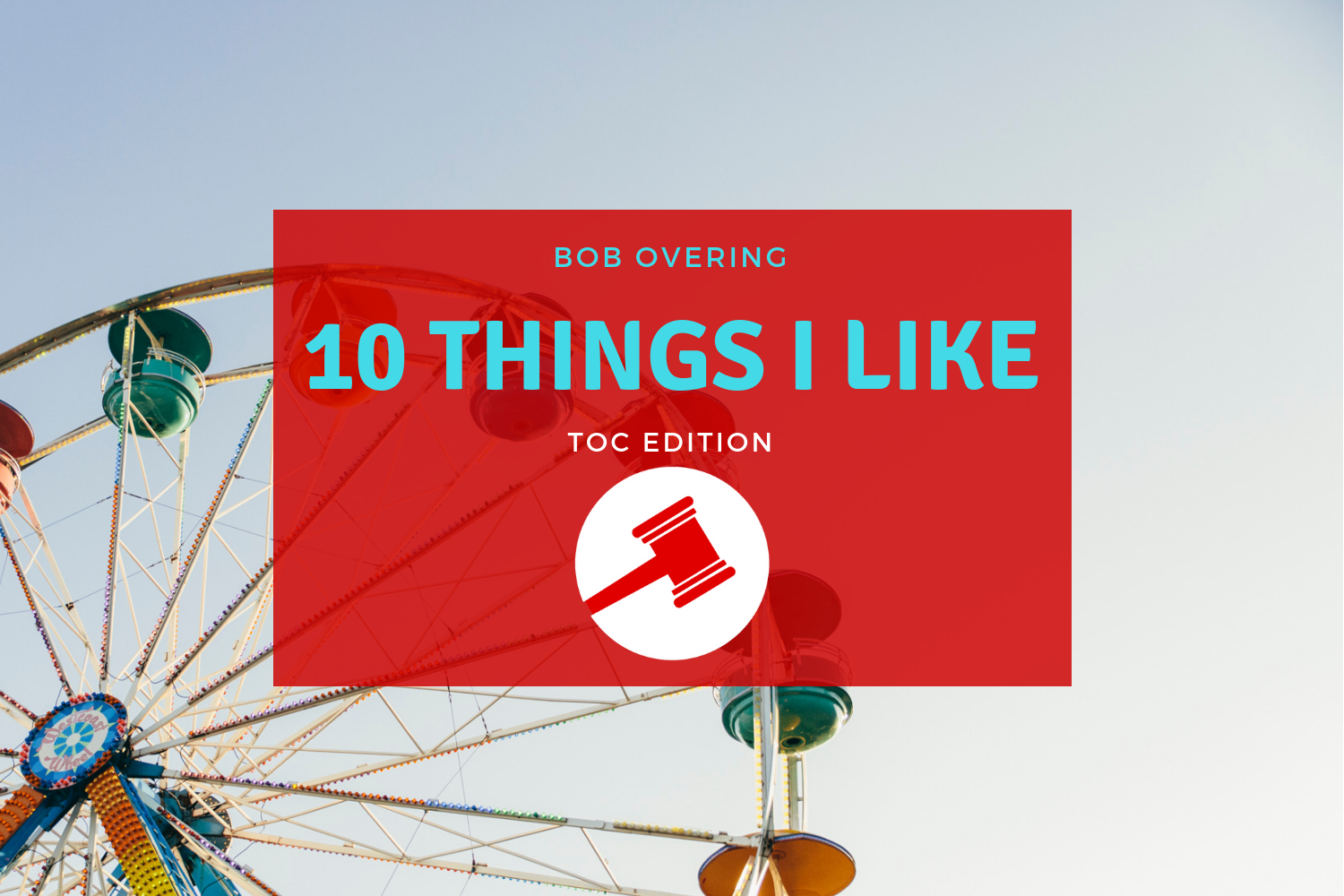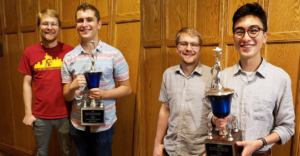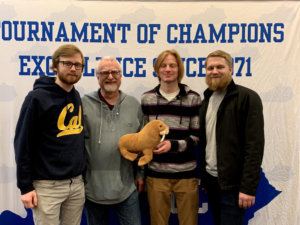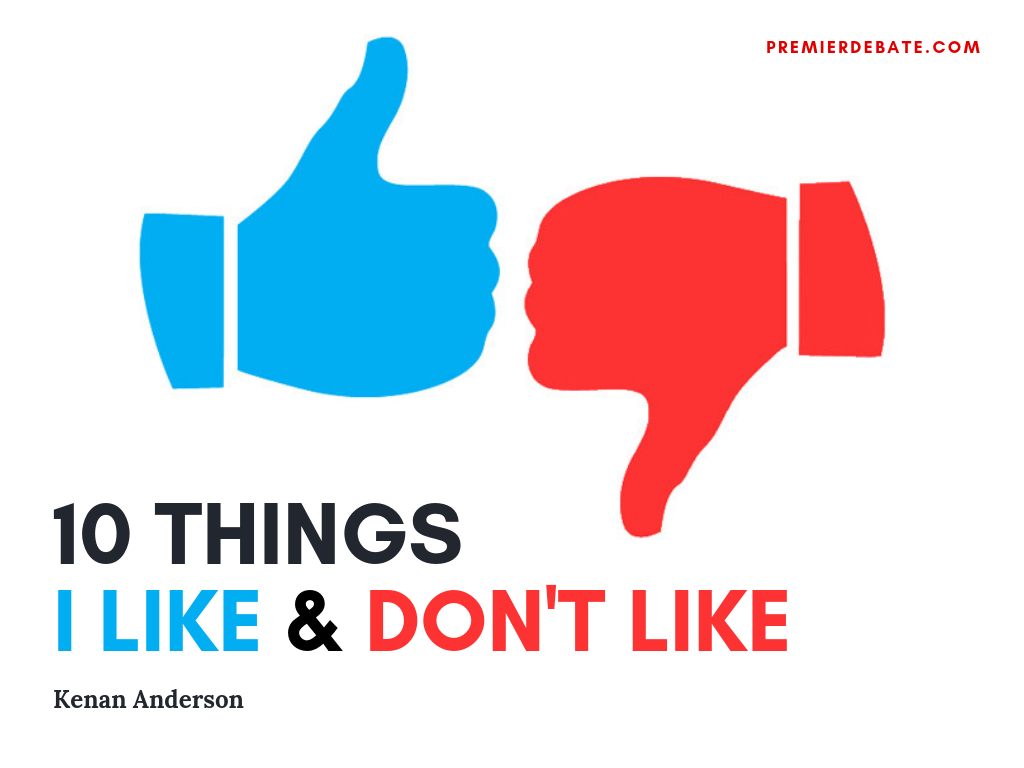10 Things I Like, TOC19 (Bob Overing)

As of last Monday, the LD circuit season is officially over! Congrats to Ishan Bhatt from St. Andrew’s and Jaya Nayar from Harvard-Westlake on their tremendous tournament! I had a chance to watch both of them in elims, and their success was definitely well deserved. They both showed excellent argumentative flexibility, stamina, and preparation. In a relatively open field—only one debater won multiple octas bids this year (St. Andrew’s IB) and three were in finals of multiple—they found ways to distinguish themselves. As a side note, I’ve long said that the Glenbrooks is the best predictor of TOC success, and this year’s TOC final was a rematch of Glenbrooks finals with the same result! (Thanks to Connor Lindquist of Loyola for his research on these points.)
I had a blast coaching seniors Andrew Overing (Loyola) and Andrew Garber (Cambridge Rindge & Latin School) and junior John Choi (Loyola) and sophomore Nevin Gera (McMillen). They all had great seasons and showings at TOC. More on the two seniors below. Congrats! And thanks to coaches John Scoggin, John & Michael Overing, and Ideen Saiedian, who were great to work with during the tournament.
This year is a little strange for me because I’m not signed on to coach any non-seniors for next season; usually, when I was a continuing coach for Loyola, Walt Whitman, or Cambridge, I would know all of my returning students and what they need to focus on at camp to gear up for the next year. This upcoming season, I’ll be coaching solely through the Premier Debate Coaching program, which is a weekly one-on-one coaching and shared Dropbox service we offer through this site. If anyone is interested in coaching from me and our excellent faculty—or applying to join our suite of coaches—reach out!
As is my tradition, I will ditch my normal “10 Things I Like and Don’t Like” because I only have good things to say today. Without further ado, here are ten random musings, featuring last weekend’s Tournament of Champions! Click here for last year’s TOC results and musings. Click here for the last edition of 10 Things, featuring Harvard (Kenan Anderson).
#1 Premier Successes at TOC
I’m obliged to start with special congrats to Premier alums, coachees, and incoming new faculty for their performances at TOC:
- Ronak Ahuja, Junior Faculty (main camp plus Kritik Week) and alum: semifinals and undefeated top seed
- Michael Ning, alum: quarterfinals
- Andrew Garber, coachee: quarterfinals
- Kumail Zaidi, alum: quarterfinals
- Beckett Larcher, two-camp alum: doubles
- Dennis Tang, Junior Faculty: break round
- Andrew Overing, Junior Faculty and many-time alum
- Nevin Gera, alum: 3-3 as a sophomore
- John Choi, alum: 3-3 as a junior
And qualifying but not attending (thankfully or we all would’ve lost more rounds):
- Carolyn Zou, Junior Faculty
- Varun Paranjpe, many-time alum
Many of our alums were non-seniors, and we expect big things from them in upcoming seasons!
#2 Recordkeeping
As somewhat of a historian in this space in years past, I like to keep tabs on a few TOC-related records. Last year, we saw a sophomore in finals of TOC, huge numbers of non-seniors in elims, SoCal with 6/16 octas participants, and Harvard-Westlake potentially breaking the team bid record. This year, there are two records very likely broken—at least as far back as my knowledge goes (about 15 years).
First is Harvard-Westlake with something like fifty or sixty team bids. If you fully discount ghost bids—and I’m not sure that you should—they’d still be above forty five. I’m fairly confident that’s the record. They also won three octas bid tournaments with three different competitors, reminiscent of Greenhill in 2016-17. I judged some of their sophomores, who are also quite good, so they’re not going away any time soon. There’s a legal term res ipsa loquitor, which roughly means ‘the thing speaks for itself.’ I’ll leave it at that.
Second is Paras Kumar, who has just coached a TOC finalist three years in a row and a champion in two of three years. I don’t think anyone has ever done that—not even Navot Tidhar. Paras is basically the Steve Kerr of LD debate coaching. I understand that he has a large squad of elite debaters and coaches and they deserve credit too, but what he’s done—which I covered in this space in 2017—was novel and remains an elite group of talent on the circuit. I didn’t see Paras much this year, so I don’t know how much he’s still involved, but as far as private coaches go, he is still one of the greats.
In other news, Wes Des Moines Valley CT ends up with about 20 career bids, short of the career bid record by about six, but qualifying four times is impressive nonetheless. Four-time qualifiers is a short list (that’s a research project for another time). Santa Monica RE ends up with 11 bids on the season, short of the single-season record by three, but adding himself to the short list of debaters with 11 since the record was set in 2011: Harrison RP (’17), Peninsula JL (’17), Torrey/Del Mar VB (’15), and yours truly (’12). Could next year be a record-breaking year for career and single-season bid totals?
Lastly, I believe every quarterfinalist was a minority debater in some respect, which continues an encouraging trend. I wrote last year that LD lags behind policy in terms of diversity of competitors and judges, but the gap may be shrinking. We all need to do more to encourage gender and racial diversity; one of the ways we do this at Premier Debate is by partnering with the Voices Foundation to match need-based scholarships to our summer programs, but there is always more to be done.
#3 Scorekeeping Planorama
Plans won bigly on JF19 and at TOC. I looked at the wikis of all sixteen debaters who made it to TOC octafinals, and 75% read regime-specific (or two regime) plans on JF19. Those plans included Saudi Arabia, Uganda, Ukraine, Central Asia, Philippines, Israel, Saudi Arabia plus UAE, Latin America and Caribbean regimes, Venezuela, Cameroon, Burundi, Egypt, and the Great Lakes region. At TOC, the top sixteen debaters read eight plans: Saudi Arabia, Uganda, Ukraine, Central Asia, Philippines, Israel, Latin America/Caribbean, and Egypt.
Does this list hurt my argument about functional limits on plan affs? Maybe (and I think better topic wordings could easily fix the issue), but on a five month topic, I believe that top debaters are more than capable of preparing for eight or so legitimate affirmatives. Plus, some of those affs had T-authoritarian problems (Israel, possibly Ukraine), some had inherency problems (e.g. Cameroon, Burundi), and some just had problems (Venezuela, unclear). So when you get down to it, debaters really had to know just Saudi Arabia and North/East Africa, and the others were infrequent enough that you could pick and choose which to master based on matchups.
I don’t think anyone is surprised by the glut of plans in the metagame at this point. But what might surprise you is that of the sixteen octafinalists, only five (31%) ever read T-‘regimes is generic’ on the longest topic of the year. Include T-‘all regimes’ and T-‘regimes is two or more’ and the number is eight of sixteen (50%). Only two of sixteen octafinalists (13%) read T-‘regimes is generic’ at TOC.
The fact that elite debaters aren’t finding T-generic to be strategic even as a throwaway 1NC argument is extremely telling. It could be that affs are better at defending against it, which is probably right, or that affs are preempting it more effectively. Either way, for fans of plan debate and opponents of endless topicality debate, TOC was a huge success. I suspect that most debaters found JF19 extremely debateable and enjoyable as a result, even accounting for the breadth of affirmatives. Anecdotally, I know this topic was received much more favorably by debaters than SO18 and ND18. I hope the Wording Committee takes note!
#4 Open Source Disclosure
All but one of the sixteen octafinalists open sourced their evidence on JF19. A few did not include highlighting in their source docs, but the vast majority did. That is incredible and such a welcome change.
I may be beating a dead horse here (please excuse the anthropocentric metaphor), but any advance in disclosure norms ought to be celebrated, considering how far we’ve come. When I wrote a series of disclosure posts just two seasons ago and challenged noncomformists to public debate, there were still prominent coaches with elite debaters who:
- discouraged their students from disclosing anything at all (and coached their students to use the coach’s policy as a response to theory)
- refused to vote on disclosure theory
- thought disclosing a book of dense moral philosophy was adequate
- refused to flip for sides when pairings came out
- wrote blog posts and articles vehemently defending non-disclosure
- had their students ensure deletion of cases from opponent inboxes and flashdrives after debates
So yes, I wrote at least six or seven posts on disclosure on this site, and I faced some backlash and quite a bit of snark for doing it, but y’all don’t know just how bad it was not that long ago. Remember the dark ages!
#5 Saudi Arabia Adulting
Five of sixteen octafinalists at TOC read the Saudi Arabia aff at TOC. Some read it in every aff round—shoutout to Charlotte Catholic DE! I’m sure there were many more reading the plan in prelims and doubles, but I haven’t gone through everyone’s wikis yet.
Why is this awesome? Saudi Arabia was by far the biggest aff in the metagame with the best disads against it; thus every round was a grind and a true knowledge and prep competition for these students. Reading a Saudi aff is saying ‘yeah, you’ve had five months to learn my aff, so what?’
This is an unprecedented level of swagger. You had a similar situation on JF18 (the mass incarceration aff) and JF16 (gun violence is militaristic/hypermasculine aff), but those didn’t have near the case negging potential that Saudi Arabia invites: prolif, terror, relations, oil, Syria, China, Iran… Not to mention generics like conditions, reform, politics, etc. that the Saudi aff does little to avoid. Plus, unlike previous TOC topics, this one is so broad it really rewarded late topic innovation, but Saudi teams stuck to their guns, calmly confident that their prep would beat yours.
If you won TOC debates on the Saudi Arabia aff, you had to DEBATE. No avoidance, no tricks, no cheapshots. Saudi Arabia debaters came to debate the core of the topic. I told some of my students—the ones who knew that aff best—not to make it too complicated, too cute: just be an adult, read Saudi Arabia.
Was it always strategic to read Saudi Arabia? I dunno. Probably not. Who cares. It’s awesome.
#6 Space for Flex and (Some?) Mono-Styles
One of the themes I’ve charted in this space is the rise of argumentative flexibility in LD. It used to be that there were really just two types: stock/policy debaters and framework/tricks debaters. Then stock/policy debaters learned theory to beat the framework debaters, which the latter then learned better and claimed for themselves. K debaters came along and were a challenge to both groups.
Somewhere around 2016 the divide started to melt, and the top debaters of that year were well-versed in all four major argument types: policy, theory, framework, and kritik. I lauded the 2017 champ, Premier Debate alum and former faculty member Parker Whitfill, for exemplifying the trend. In 2018, I wrote this post articulating the reasons for sustained flexibility and even predicted that the TOC winner would be similarly flexible, a master of three of four styles at least.
I don’t know if I was right about TOC 2018. Based on TOC 2019, it looks like flexibility is still extremely valuable but teams specializing in policy and kritik debate can do just as well. Three of eight quarterfinalists were primarily K debaters! Eight of sixteen octafinalists were primarily policy debaters (with some K chops). A really good policy debate is probably my favorite type of debate, so I’m really happy to see policy specialists having this level of success (shoutout to Charlotte Catholic DE on an excellent performance as a junior).
The top K debaters of this year were super enjoyable to watch as well. Special shoutouts to K specialists I’ve watched grow over this season and previous ones: Halstrom RA, Kamiak NB, Oak Hall KZ, and Lake Travis BL. There were a few others at TOC and in elims, but these were the four I watched the most. Anyone who judged them or coached against them knew they were fearsome, and a win would not come easy. They really know their stuff.
There is definitely increasing room for policy and K specialists at TOC; can we say the same about moral philosophy debaters? I think three elim debaters out of twenty nine (10%) read a moral philosophy aff at TOC. Shoutouts to Strake VL and West Broward EM. Of those three in elims, one made it past doubles (so one of sixteen, or 6% of octafinalists). Eyeballing the disclosure of the rest of the pool, the percentages are similarly low. It seems increasingly difficult to justify specializing in moral philosophy at the highest levels. This is especially true at a tournament like TOC where you have maybe ten more college policy judges in the pool.
Apparently on the west coast, where I haven’t ventured for some time, it is increasingly common to eschew reading moral framework altogether. LD is well on the path to become policy debate with shorter speeches. Before extinction of moral philosophy is complete, we should think about what might be lost and what we can do to protect debate as a home for everyone. I am pro-policy and I am pro-kritik, but that doesn’t mean the old ways are valueless or ought to be eradicated! I worry that in two years, we may just be doing policy debate. I like policy debate but not if it crowds out everything else. Something to keep tabs on.
#7 Clash of Styles, Maybe Even Civilizations, But Not People
This year’s TOC and this season in general were, as far as I could tell, relatively controversy free. Given what I just said about major differences in styles and approaches to debate, it’s commendable that the community can run any high-stakes tournament so smoothly. My experience this year at major invitationals and round robins especially was one of mutual respect, friendship, and kindness.
At TOC there will inevitably be some post-round grilling, some heartbreak, and general anxiety. And as a community, we put a lot of emphasis, probably too much, on the Tournament of Champions. And that means for the vast majority of competitors, TOC can be pretty stinky. Yet despite all that! The vast majority of people I talked to had really pleasant interactions with one another at the tournament. We’re not perfect, we can do more—myself included—but I am so proud of this community!
#8 A Great Year for Debate Content, But We Need More!
Articles, blogs, podcasts, rankings, affinity groups, nonprofits, rounds on YouTube, meme groups, introductory materials, briefs, metagame breakdowns, polls, lectures, squads, and more! This year was a great year for the production of LD content, and it’s growing in quantity, quality, and diversity around the community. At Premier, we brought on more coaches and blog contributors than ever before. And it’s becoming easier to learn circuit LD, despite increasing depth and complexity.
We want to do more in these areas, and we need your help! Send us rounds, articles, and introductory content. Sign up to be a coach on a weekly basis or freelance as need arises. Help us produce the best and biggest FREE brief in the country. We’re always looking to add people, and there are so many ways to get involved.
I dropped the ball on filming rounds at TOC this year. I think I was really locked in on coaching. I want to emphasize the need for more minority debaters on film and that it’s so so easy to do. If you’re a debater or coach with rounds, even from old topics, send ‘em our way. If you’re competing or judging next year, consider filming. Most new smartphones are good enough to get good video and audio quality. Just set it up, upload to Drive or Dropbox, and share the link!
#9 End of Era: Cambridge Rindge & Latin
I’ve had the immense pleasure of coaching debaters from Cambridge Rindge & Latin School for four years. Warning: I’m going to both gloat and embarrass them. As anyone who debated or judged Andrew, Martino, Ollie, and Paloma knows, these kids were wicked smart and worked as hard as anybody. They won Yale, Apple Valley, Lexington (twice), Harvard, Apple Valley RR and were in finals of the Glenbrooks, Yale, and Harvard. They did it reading original arguments and new takes on old ones: moral deference/testimony, God frameworks, virtue ethics, pragmatism, paradoxes of deontic logic, strange plans like drone strike torts and Burundi, and strange frameworks like cosmopolitanism and pacifism. Huge shoutouts and many thanks to coaches Mathew Pregasen (the OG), Marshall Thompson, Reed Weiler, Alan George, and Paloma O’Connor and Oliver Sussman for their help over the past few seasons.
Andrew Garber had huge shoes to fill this year and debated with little support as a senior. Younger debaters can and will learn a lot from him, especially that one can be kind and friendly while still being a fierce competitor. (Some other debaters this year who exemplified this were Stuyvesant CL, Hunter College MN, Byram Hills LP, and Westview RS!). Although he didn’t believe it, Andrew was feared as framework debater, which is a testament to his reading and smarts more than anything. I firmly believe he was the best T-‘regimes is generic’ debater of his year. His thoughts on the subject were a great foil for me and helped strengthen a lot of the arguments I’ve made and will make on this site.
Andrew is a model for how more framework- and theory-inclined debaters can still succeed at the highest levels, even as their numbers dwindle. That said, we had to make a number of tough strategic calls at TOC, one of which future debaters might think hard about: when is it better to refine your comparative advantages (in this case, framework and T/theory) rather than shore up your comparative weaknesses (in this case, K and to some extent policy)? We did more the former—teching out our T-generic blocks and 1NCs, rather than practicing new policy positions to the extent we might’ve. For TOC, we prepared three new affs—one philosophical (octas and quarters) and two more policy (unbroken). We were at a skill deficit in policy debate in both our octas and quarters debates, but would a new plan aff been enough to overcome it?
I don’t know. It’s tough to say when to go into the teeth of the defense, rather than stick to your strengths, even if they are more predictable. If we had something really new or original, a substantive policy trick or well-prepped impact turn debate, maybe that’s the call. Something to think about for future TOCs. If we had to go out, I’m glad it was to the champ in a rematch of Harvard finals. St. Andrew’s IB was the best debater of the tournament, and he beat us on one of his best arguments—the afropessimism K.
It looks like this is the end of the Cambridge Rindge & Latin School era in LD debate. I understand the young ones are pursuing PF debate now. Cheers to the end of a great run from a great program!

#10 End of Overings
I can’t write a three-thousand word blogpost without mentioning the end of another era. And I can’t detach myself and pretend this isn’t a special season for me and my family. With my youngest brother Andrew graduating, there are no more Overings competing in high school LD debate after eleven seasons!
It ended with a bang—Andrew qualified to TOC this year, eight years after I did, which is really, really cool. And it’s also cool that he did it reading much the same arguments I did: plans and theory with a little framework on the side. Unsurprisingly, Andrew is in many ways cut of the same cloth as John and I. He loves debate and the people in it, so I expect he’ll stick around and coach and judge and teach and write blogs and all of that. The Overings are done competing, but Loyola debate will live on. Now I better cut this off before I get anymore sappy. Overing(s) out!

(pc: Katherine Fennell & Wally)



